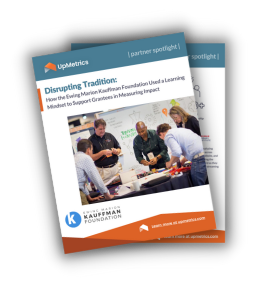Beyond the Grant: How Funders Can Build Grantee Capacity for Lasting Impact
Building the capacity of grantee organizations is essential for enabling them to scale their operations, enhance their impact, and achieve their missions more effectively. By focusing on the true needs of the community, emphasizing data-driven collaboration, and fostering equitable partnerships, funders can support grantees in meaningful and sustainable ways.
Understanding Community Needs
Effective capacity building starts with funders deeply understanding the needs of the communities they support. This requires ongoing dialogue with grantees to ensure that investments align with their actual challenges rather than assumptions about what they need.
For example, one of UpMetrics' grantmaking clients, the Blue Cross Blue Shield Foundation of Louisiana (BCBSFL), identified that nonprofit grantees often needed more than just funding—they needed stronger operational capacity and strategic guidance. In response, they launched a capacity-building initiative that provided customized consulting, technical assistance, and leadership development programs to grantees. Instead of offering one-size-fits-all funding, they tailored their support to address gaps in organizational infrastructure, helping nonprofits build sustainable systems for long-term impact.
To hear how BCBSFL is strengthening relationships with grantees by focusing on support strategies that take their capacity into consideration, watch our on-demand webinar.
Promoting Data-Driven Collaboration
A strong data strategy helps both grantees and funders make informed decisions and demonstrate impact. Funders who invest in data capacity—whether through training, technology, or support—enable their grantees to articulate outcomes more effectively, ultimately strengthening the case for continued funding.
BCBSFL recognized that many of their grantees were struggling with data collection and impact measurement. To address this, they partnered with data experts to provide training and tools that helped organizations establish better data systems. One initiative helped nonprofits streamline their reporting processes, reducing administrative burdens while ensuring that both funders and grantees had access to meaningful, real-time insights about program effectiveness.
UpMetrics also supports funders and nonprofits in building impact measurement capacity through cohort-based learning programs, where organizations receive training, peer support, and access to data tools to strengthen their measurement practices. A recent example is the Southeast Michigan Community Impact Cohort, sponsored by Ballmer Group. This program brings together nonprofits to develop their impact measurement strategies, learn best practices, and implement data-driven decision-making. By fostering a collaborative learning environment, funders can ensure that grantees build long-term skills in data collection, analysis, and storytelling—essential components for sustainability and growth.
Another funder realized that grantees were collecting data but not always using it to inform their decision-making. Instead of requiring them to revamp their systems, the funder facilitated a peer learning initiative where organizations could share best practices and receive support in implementing stronger data collection frameworks. This not only improved reporting quality but also fostered a collaborative community of practice.
Championing Equity in Capacity Building
An equity-driven approach to capacity building requires funders to recognize and address systemic barriers that may impact grantees, particularly those led by communities of color or historically underfunded organizations. Instead of dictating solutions, funders should engage in meaningful conversations about what success looks like for grantees and how they can best be supported.
BCBSFL took an equity-focused approach by prioritizing unrestricted funding for grassroots organizations led by and serving historically marginalized communities. They recognized that traditional grant structures often placed a disproportionate administrative burden on smaller nonprofits, preventing them from focusing on mission-driven work. By shifting toward more flexible, long-term support, they helped grantees invest in their own infrastructure, leadership, and program sustainability.
Similarly, UpMetrics’ cohort model ensures that grantees receive the resources and training needed to build internal capacity rather than just responding to funder requirements. In the Southeast Michigan Community Impact Cohort, participating nonprofits are given tools and guidance to collect, interpret, and apply data to strengthen their programming and fundraising efforts. Programs like these level the playing field for organizations that may not have dedicated data teams or analytics expertise, ensuring that every nonprofit has the opportunity to use data effectively to drive impact.
Strategies for Effective Capacity Building
- Tailored Support: Offer support that aligns with the specific needs of grantees, whether through funding, technology, training, or other resources.
- Sustained Engagement: Maintain ongoing collaboration to adapt support as grantees’ needs evolve.
- Resource Provision: Provide access to tools and platforms that enhance operational efficiency and impact measurement.
- Facilitating Peer Learning: Encourage grantees to share experiences and best practices, fostering a community of learning and mutual support.
By implementing these strategies, funders can create an environment where grantees are equipped to scale effectively, leading to more impactful and sustainable community development. Capacity building isn’t just about providing financial resources—it’s about creating the conditions for organizations to thrive long-term.

February 21, 2025

